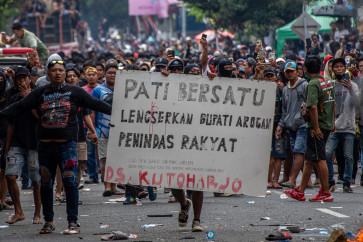Popular Reads
Top Results
Can't find what you're looking for?
View all search resultsPopular Reads
Top Results
Can't find what you're looking for?
View all search resultsUber, maximizing public benefit and policy responses
Thousands of public transportation and taxi drivers have several times taken to streets, demanding the government ban the ride-hailing applications such as Uber and Grab since they are responsible for the protestersâ dwindling incomes
Change text size
Gift Premium Articles
to Anyone
Thousands of public transportation and taxi drivers have several times taken to streets, demanding the government ban the ride-hailing applications such as Uber and Grab since they are responsible for the protesters' dwindling incomes.
The existence of the apps-based transportation services truly creates regulatory challenges, just like most 'disruptive innovation' business models do.
Yet, the policy action of the government and regulators should not only be between prescriptively enforcing existing regulations and directly prohibiting the new business model taking its place in the market. These actions could restrain innovation and limit the possible benefits from new models.
Uber is a US-based mobile-app that provides a ridesharing platform, which links customers wanting transport with drivers for a fee. Uber is not registered in Indonesia as a transport operator company. It is instead a legal entity in Indonesia and registered as a taxpayer. Unlike traditional taxi companies, vehicles used on Uber are not owned by Uber itself but by transport companies or by other entities dubbed as partners in the circular.
Uber is only an application that pools those entities together to providing a transportation service for the public. As it does not charge a fee to its members from their transport service income, the government cannot tax Uber for such services. This creates a potential loss of tax revenue, which actually could be charged by the government if such services are undertaken by traditional taxis.
The government could manage this issue with a new regulation. As the mechanism used by Uber requires the car owner to register to Uber through a limited liability company (LLC), the government will receive tax from both the LLC that operate under Uber and the individual car owner.
_________________________________
Some countries have already required Uber drivers to register at their taxation office.
The LLC will report their income including from its ride-sharing service. As for the car owner, Uber requires the driver to submit their tax identification number (NPWP or widely known as a social security number) when they register with Uber.
Although, most of the car owners will have income below the non- taxable income threshold, the government should ensure these drivers register to the taxation office and fill their tax report accurately. This approach is both necessary and appropriate to ensure neutrality in tax treatment between competing services.
To maximize the potential tax income from this business model, the tax office should coordinate with both the Communications and Information Minister and Uber to get the monthly income records of all the cars operating under Uber.
Some countries have already required Uber drivers to register at their taxation office. From August 2015, the Australian Taxation Office (ATO) confirmed all Uber drivers have to register for the goods and services tax (GST) and submit the GST portion of their Uber fares to the ATO.
The same regulation also had been conducted in the Philippines by its Bureau of Internal Revenue. The transport network companies and their partners should be registered at revenue district offices and secure electronic invoices to be submitted to the office.
Since analyzing the right comprehensive regulation (e.g. licensing requirements, vehicle inspections, etc.) needs long-term planning and a holistic approach, taxing both the limited liability companies and the car owner is a short-term solution to helping the government keep pace with market developments, while eliminating some external cost caused by Uber. The risk of Uber, which is not really being considered by government regulators, increases with every new Uber driver hitting the road.
While the spirit of this new business model is to save transport costs by ridesharing, in reality there are many car owners using their car for Uber or hiring a driver to operate their car for Uber for the whole day. In addition, many people buy new cars so that they can join Uber.
These action will lead to more traffic on the road and increase road safety risks. In addition to the above tax treatment, the government should create a regulation or consider some criteria for Uber to manage the potential costs to public amenities as the result of increasing traffic and road safety risks.
When considering the regulatory responses to new business models, government should assess the perceived risk level of the new business, as well as, reassess all current regulatory requirements for existing businesses, in order to achieve the desired net benefits for the community.
Claims by incumbent businesses to maintain the current level of regulation for all businesses should be carefully assessed to ensure that the regulatory framework is not being used as a barrier to prevent a greater level of competition, which would benefit consumers and the broader economy.
By conducting a deeper assessment, the government can implement the right policy response whether if it makes a no-action policy, make a new regulation to regulate the 'grey areas' or amend the current regulation for the conventional business model.
Whatever response the government choses, in the end, it has to be prompt and swift. This business and other similar model (e.g. Gojek, GrabBike, etc.) is growing fast. Thus, a timely response from the government is key.
________________________________________
The writer works at the Finance Ministry and is an alumnus of the University of Indonesia. She has just completed an internship with the Australian Government's Productivity Commission. The views expressed are her own.










